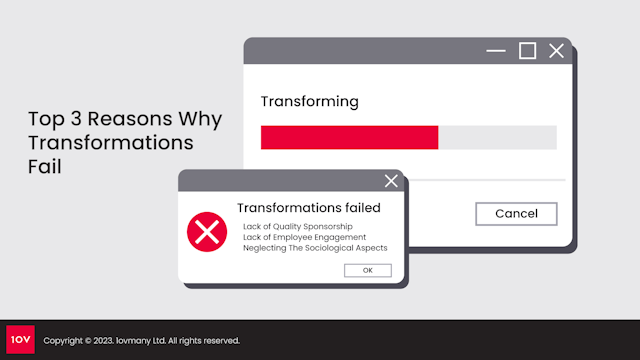How Being a CEO Changed My Perspective of Data-Driven Practices
What are the problems we're seeing relating to data and a business' ability to track, analyse and interpret data? How can companies utilise data effectively?
8 August 2023

Problem Context
Coming from a background in Agile, my focus has primarily been around downstream data, regarding speed of delivery, flow and execution, never really too much so on the inputs that concern the strategy of what the business is trying to achieve and influence.
But since me and my Co-Founder - Taner Kapucu - started our own business, we’ve developed a different kind of appreciation for how organisations process and interpret the vast amount of information at their fingertips.
Companies we’ve worked with - are eager to tap into the valuable insights from large amounts of information they collect and integrate these insights into their decision-making processes. However, very few are reaping the rewards promised from data analytics.
We’ve discovered that many are unconsciously finding themselves either drowning in data overload, unable to make informed decisions, or struggling to connect insights to tangible changes and customer impacts.
Why are we seeing this problem?
The challenge begins with understanding what data is needed and why, followed by capturing and integrating it into decision-making processes.
Often, the lack of a clear focus on what really matters compounds the problem, leading to three key sub-problems:
Data Overload
Some organisations have access to copious amounts of data, but they lack the expertise and tools to effectively utilise it.
Consequently, they find themselves lost in the sea of information, unable to discern meaningful patterns or actionable insights.
Data Scarcity and Vanity Metrics
On the other hand, some organisations we’ve met with are suffering from a lack of data.
They could be measuring superficial metrics that may look good on paper, but fail to provide meaningful insights or drive measurable business value.
Lack of Direction
And then in some cases, organisations lack both the data and a clear understanding of what they should be measuring.
It’s often the case that these companies’ focus is solely on delivery and revenue, in the absence of strategic direction or long-term vision.
How can we address challenges with data?
The journey towards data-driven success starts with figuring out what it is you want to measure and developing a clear understanding of precisely where the data lies, what to look for, and what specific metrics to track.
One framework that we’ve found to be particularly effective, in helping to solve this upstream challenge of identifying the ‘right’ data to utilise, is OKRs (Objectives and Key Results).
OKRs help organisations define clear objectives and measurable key results that align with their overall strategy, enabling them to focus on what truly matters to the business.
That being said, there-in lies a conundrum many of the businesses I’ve seen attempting to utilise OKRs struggle with.
While OKRs are brilliant for communicating strategy throughout the organisation, we still need those top-level metrics and strategic imperatives (what matters most to the business) on which to base the Objectives and Key Results.
Data & OKRs go hand-in-hand
One of the most significant inhibitors to successful OKR implementation is the lack of insights and a clear starting point.
OKRs should be connected to and aligned with top-level impact metrics, forming a cohesive relationship between operational actions and strategic objectives.
To give you an example, I recall the first transformation Taner and I did together using OKRs, the startup had three critical imperatives they were chasing.
We sat down with the CEO, who told us ‘this is what matters to the business, this is where we’re going, these are the imperatives.’
The imperatives then served as beacons for us when working with the teams, guiding them to pursue actions that directly impacted their key results and strategic objectives.
Through having a clear idea of what mattered most to the business, we were able to formulate OKRs that aligned with the company strategy.
In doing so, the data that would allow the teams to gain insights & learning towards achieving their Objectives and Key Results, became evident, and we were able to help them channel their efforts efficiently and effectively.
To truly unlock the potential of data and OKRs, organisations must abandon siloed thinking.
Data and OKRs should be interconnected throughout the organisation, forming a web of causal relationships, which can then lead to informed decisions that drive meaningful outcomes for the company.
This is why we start our OKR engagements with a Metrics Workshop, to determine what matters most to the business, in the form of Customer Performance Indicators (CPIs), Health Metrics and Key Performance Indicators (KPIs).
These can then be used with OKRs to create a data feedback system in which you can achieve clarity on what's important, then create, communicate and constantly validate that hypothesis.
Final Considerations
With the right approach, data can be an invaluable asset for organisations, and the rewards of championing insight-driven practices can be hugely significant for a business.
The key lies with establishing a structured path to navigate the vast information landscape, avoiding the pitfalls of overload, scarcity, and misdirection.
Everything I’ve done with the companies that we’ve worked with, has led me to believe that OKRs hold the key to unlocking a focused data strategy.
Through creating clear objectives, measurable key results, and aligning them with strategic metrics, we’ve seen organisations make better and more informed decisions that lead to significant customer impacts and long-term success.
Download our Full Guide to Delivering Measurable Business Value at Pace for more insight on the matter of data utilisation.

About the author
Mike Horwath
Mike is the Co-Founder and Co-CEO of 1ovmany. He is also the Co-Author of The OKR Method a Strategy & OKR Expert and at times an Executive Business Transformation Coach.






































